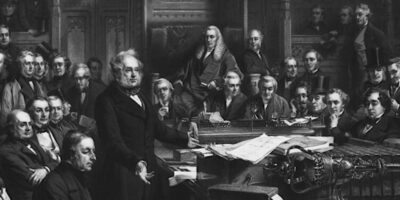Trade Has No Losers
This claim that free trade has losers as well as winners is, unsurprisingly, featured front and center in arguments offered by free trade skeptics. Noah Smith’s statement is typical: “We’ve known since the time of David Ricardo that even if free trade makes a country richer overall, many of the people within that country can be left worse off.”
Another example is from the heterodox economist Dani Rodrik: “Economists have long known that trade liberalization causes income redistribution and absolute losses for some groups, even as it enlarges a country’s overall economic pie. Therefore, trade deals unambiguously enhance national well being only to the extent that winners compensate losers.”
Yet the claim that trade has losers is no less often made by free trade’s proponents. To pick just one among countless examples: the Niskanen Center’s Brink Lindsey, whose credentials as a knowledgeable free trader are beyond question, describes as a “hard truth” the claim that “international trade creates losers as well as winners.”
The conventional economic case for free trade rests on the demonstration that the value of the winners’ gains from expanded trade consistently exceeds the value of the losers’ losses. And as even Lindsey insists, losers there certainly are. Lindsey’s justification for free trade in light of the apparent reality of these losers is representative of justifications offered by most free trade proponents: “The net result [of freer trade is] higher productivity, and wages and living standards, for the country as a whole.” The gains enjoyed by free trade’s winners — being dependably large enough to allow these winners, in principle, to fully compensate free trade’s losers and still enjoy positive gains — justify free trade. In the jargon of welfare economics, free trade is “Kaldor-Hicks efficient” and, hence, justified as a matter of public policy.
The “Losers” From Trade Are Merely “Losers” From Competition
This “loser” language, however, is completely mistaken. Saying that trade has losers suggests that stopping trade would eliminate such losses. Yet as Lindsey himself correctly observes, jobs and businesses in market economies are routinely destroyed even when international trade plays no role. Therefore, even if (contrary to fact) people who lose jobs in market economies are appropriately described as “losers,” blaming such losses on trade conveys the impression that trade’s role in inflicting such losses is unique and, hence, that such losses could and would be eliminated if trade were stopped. But this impression is false. Trade is not unique in causing such “losses.”
Trade with people classified according to where they live differs in no ethically or economically relevant way from trade with people classified according to other criteria. This important point is almost totally ignored in both popular and academic discussions of trade. And that’s a shame, for avowing that trade among people who live in different political jurisdictions creates losers is akin to avowing, say, that trade among people with different genitalia — trade of men with women — creates losers.
It is, after all, undeniable that when women entrepreneurs introduce new products or devise more efficient means of production, or when female consumers change their spending patterns, some workers lose jobs and some business owners lose profits. Yet no one writes that it’s a “hard truth” that trade with women “creates losers.” And no one thinks it necessary to justify a policy of allowing men to trade freely with women by first demonstrating that the value of men’s gains from such free trade exceeds the value of men’s accompanying losses.
It’s obvious that competitors’ sex is wholly without economic relevance. Workers who lose jobs to innovations introduced by entrepreneurs who happen to be female are properly regarded as losing jobs simply to market competition, with nothing uniquely determined by the competitors’ chromosomes or genitalia. No analytical insight or improved perspective would be gained, and much confusion and political mischief would be sown, by singling out competition coming from women as a unique source of economic gains and losses.
For the same reason, competition coming from producers who happen to be foreign is also no unique source of economic gains and losses. Competition that domestic producers endure from foreign rivals differs in precisely zero economically relevant ways from competition that domestic producers endure from each other.
To recognize that international trade is merely one of many channels through which competition occurs is to recognize the flaw in the assertion that trade has losers. The assertion that trade has losers possesses no more meaning or relevance for policy than does the assertion that trade with women — or trade with blue-eyed people, or trade with teetotalers, or trade with baseball fans, or trade with men who wear bowties, or trade with people whose first names begin with the letter V — has losers. If each of these assertions about trade makes no sense, what sense is there in the assertion that trade with foreigners has losers? Answer: none at all.
Trade Is Trade Is Trade
The fact is that all competition and economic changes cause some workers and firms to have to adjust. Trade with foreigners is not remotely unique on this front. Yet trade with foreigners is nevertheless uniquely described as a manifestation of competition that has “losers” — a description that unjustifiably fuels demands for government to restrict trade with foreigners in order to protect its “losers.” And so to recognize that international trade, as such, in fact does not have losers beyond those that are caused by any and all manifestations of economic competition is to recognize the folly of falling for the assertion “Trade has losers” as a justification for protectionism.
If the economic case for a policy of free international trade — a case dating back to Adam Smith — is to be summarized with as few words as possible, it is this: all trade is mutually advantageous, and political borders are utterly irrelevant both to the motives of traders and to the consequences — positive and negative — of their trades.











